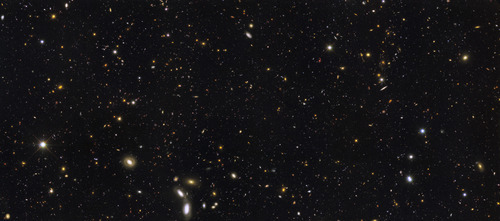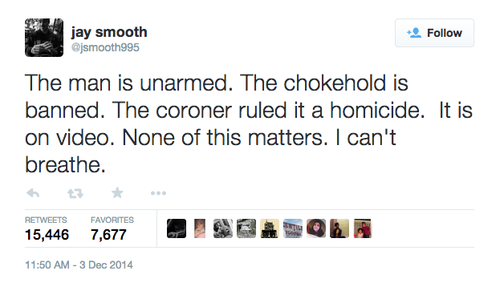By Lauren Lyons
I can’t recall the moment that it happened, but at some point in high school I decided to devote my life to exploring the universe. I’ve spent the years since then working on robots that traverse the surface of Mars, studying aerospace engineering and space policy, and most recently, helping tell the stories of the future exploration of Jupiter and its icy ocean moon Europa. And with the test flight of NASA’s new Orion spacecraft scheduled for tomorrow morning, the opportunity to wander amongst the cosmos is that much closer.
I suspect these ambitions began with daydreams, daydreams manifested in an attempt to drown out the gunshots from down the street, or the anguish that comes with seeing friends and neighbors trapped in cycles of violence and poverty. I believed that the only way out was up, and so I approached the telescope.
But in the wake of today’s Eric Garner grand jury decision, instead of looking up at the stars, I find myself looking down. I look down not just because my head is too heavy in despair for yet another case of injustice for an unarmed black man killed by police; I look down not only because I’m afraid to meet the gaze of strangers, a gaze blurred by eyes filled with tears of pain; But today, I find myself looking down because it feels like a betrayal to look up.
A betrayal to Trayvon.
To Eric.
To Michael.
To Tamir.
I have come to the understanding that in many ways, looking up has been a convenient distraction from looking around. It allows me to opt out of facing the darkness here on Earth.
Looking up gives me comfort, even in its challenges. I decided to make it my life’s work to deconstruct the values, and policies, and technologies that stand in the way of humanity becoming a multi-planet species. I take pleasure in analyzing the complexities at the intersection between politics, technology, and culture. I’ve got theories. I know which studies to run. Who the stakeholders are. What hypotheses to test.
Institutional racism, being murdered by those sworn to protect you, and a justice system that doesn’t seem to value your humanity? That, I cannot wrap my brain around.
When news of Mike Brown’s killing first broke out, people—white, black, brown, and everything in between—joined the conversation (or some semblance of it). Many on the right denied it was a thing. The people of Ferguson and the left took to the streets to demand justice and that #blacklivesmatter. And some folks on all sides got a bit distracted by the promise of an easy solution to our nation’s centuries of racism, and settled for demanding police body cameras.
And two days after President Obama makes an announcement about federal funding for said cameras, the police officer who killed an unarmed Eric Garner walks. Even though it was all caught on video.
And so I retreat to the sky.
I think of the beautiful images the Hubble Space Telescope’s cameras have collected, showing us the splendor and vastness of the universe. We gasp at the pictures in wonder as we contemplate our place in it all.
However, on Earth, on that sidewalk in New York, cameras were not enough. Cameras will never be enough.
And maybe that extends to space: after all, despite 25 years of Hubble’s magnificent images, space programs are still underfunded and we remain a single planet species.
Recently I was profoundly struck by a story a friend of mine shared with me about his father, who’d been unjustly deported from his own country. He’d been a physicist passionate about teaching, but his plight had galvanized him towards a career in politics. One day while flying over the U.S., he looked out the window of the plane and said, “They took the stars away from me and they left me with the Earth.”
And in that sentence, my heart broke. Because today, I want both the stars and the Earth.
What do we do? How do we tackle this? The moment we begin to crack open the system and see inside of it the quagmire of centuries of hate, pain, and brutality, we become overwhelmed. Some of us trudge through it because we have no choice, some of us trudge through it because it is moral to do so, and some of us are just not yet capable of seeing it for what it is.
Perhaps most troubling is that some of us have the privilege to declare that we are more evolved than all this. Our day-to-day lives do not include a risk of being shot dead in the street or having to watch our father’s killer walk free. We privileged have convinced ourselves that somehow our intellect allows us to transcend these unenlightened earthly perspectives. That race and oppression are social constructs, and therefore humanity’s progression lies in rising above this faux reality. That technology, yoga, and meditation will heal all. And that these wars and this suffering are beneath us.
But these wars and these sufferings are us. Technology, yoga, and meditation could not have saved Mike Brown or Eric Garner. And while we sit upon our thrones amongst our fellow intellectuals in our salons and unconferences, 12 year-olds are getting shot by police.
Our grand visions for the future may come through zooming out, but the action and realization of those visions come through zooming in or the reality of the present.
We all bear the burdens of the crimes and sufferings of both our ancestors and our neighbors. The people that will one day populate the surface and caves of Mars are the same ones bearing the cultural traumas of our dark and bloody roots. And the DNA of these roots will follow us, like poltergeists, to whatever exoplanets we run to.
So let’s stop running. Let’s wrestle with this. Let’s get dirty. Let the brightest minds of the day step down from their thrones and engage. Engage in not only what inspires us to greatness, but also what reflects our deepest failures as a species.
Look around at both the beauty and the suffering surrounding us.
Look inside at both our darkness and our light.
Look down in shame at our crimes.
Look up at the stars.

About the author: Lauren Lyons recently completed a Master’s degree in Public Policy at the Harvard Kennedy School of Government, where she studied Science and Technology Policy, and wrote her capstone exercise on reframing NASA’s public engagement challenge using Adaptive Leadership frameworks. She is also a graduate of Princeton University, where she earned her bachelor’s degree in Mechanical & Aerospace Engineering, a certificate/minor in Engineering Biology, and spent three summers as an engineer at NASA’s Jet Propulsion Laboratory working on the Mars Exploration Rovers and MSL-Curiosity missions.
Lauren currently works as a science communicator and writer to help organizations make their stories and discoveries more accessible to the general public. She also researches space exploration public outreach with the purpose of driving civic action and trains scientists and engineers to become better technical communicators and public speakers. You can visit her blog at: www.laurly.com.




